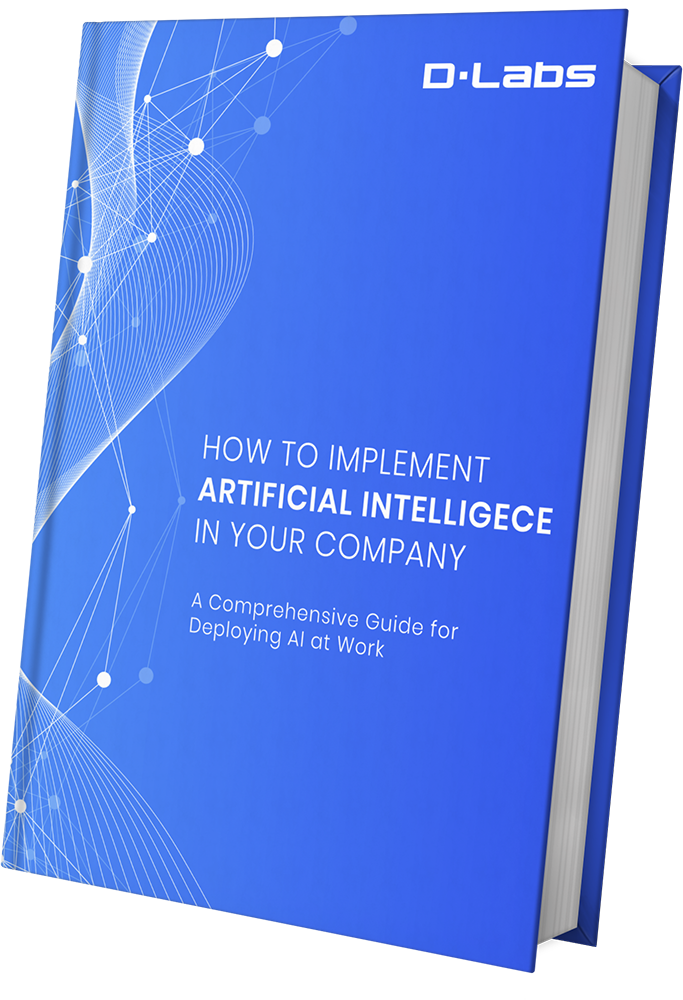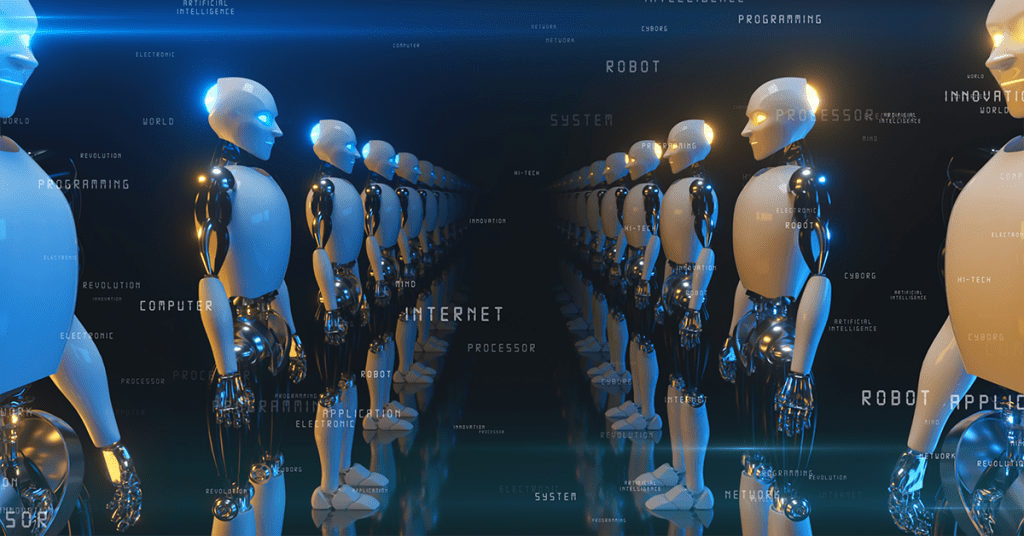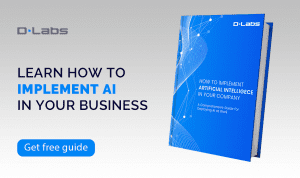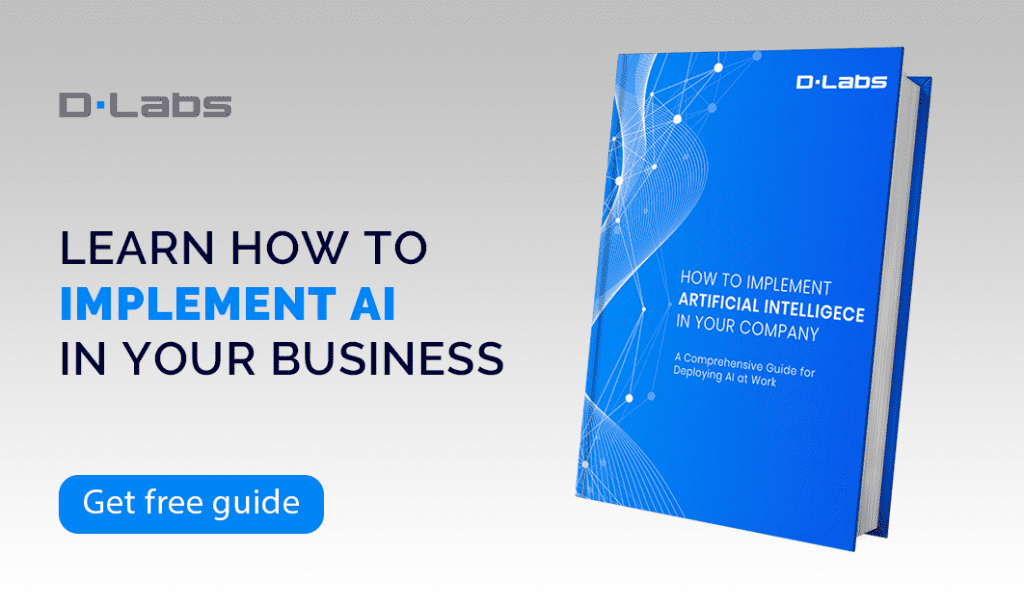‘AI is the future’ — a claim we recently made dedicated to outsourcing AI development. No matter your industry, it’s a viewpoint that’s hard to disagree with because AI is improving nearly every aspect of life, none more so than business. And one of the areas on which AI has had the most profound impact is productivity.
If you’re wondering how AI boosts productivity in the workplace (and whether it’s threatening our jobs as a result), we suggest you read on.
Future of AI in the workplace – studies and predictions
Let’s start with the numbers. According to a McKinsey Global Institute report, nearly half of all the work we currently do can be automated by 2055. But does that mean that AI will cause an increase in unemployment? Well, let’s dig a little deeper.
The same report indicates that as many as 30% of current jobs could be replaced by AI by 2030, meaning upwards of 800 million jobs worldwide could be lost to automation. So, back to the question: does that have to result in more unemployment?
No, absolutely not.
While AI will make certain roles disappear, we can’t forget this is just a natural progression in the job market. There are countless tedious and tiring tasks that machines can take on, freeing people to focus on more mission-critical items.
Moreover, machines are better at repetitive tasks that require little complicated or creative input. And they work better with large data sets: in fact, they are more capable than most at performing complex mathematical operations.
However, we must acknowledge that the technology isn’t yet autonomous. It still requires an element of human support and verification, which is why we shouldn’t see the technology as ‘threatening our jobs.’
On the contrary: it presents an opportunity to develop new, more ambitious, more creative projects, as confirmed by studies that illustrate how, with the appropriate investment and infrastructure:
AI can create millions of new jobs.
According to a study conducted by PwC: AI will displace 7 million jobs between 2017 and 2037 while generating about 7.2 million new ones during the same period. As a result, it will lead to net growth of 200,000 jobs.
How can AI increase productivity in the workplace?
As we’ve seen, AI helps people work more productively. But how can technologies that use artificial intelligence and machine learning help in everyday work? Well, a lot depends on the industry — but there are several areas where AI is most effective:
Customer Support
As we all know, people don’t like to wait. When a customer sends you a question, the quicker you can respond, the better, no matter the time of day. To prove the point: a recent Oracle report shows how over 50% of people expect a business to be open 24/7.
But the truth is: most customer queries are the same, so automating the response is a natural and obvious step. That’s why businesses across sectors are implementing intelligent chatbots that not only answer questions. They perform tasks like sending tips and instructions, scheduling meetings, providing product information, and processing refunds.
To many, chatbots are the obvious answer to meet the customers’ expectation of an immediate response. And that’s why, according to Opus Research, companies will invest $4.5 billion in chatbots by 2021.
A further benefit of chatbots is that, by taking the weight off employees’ shoulders, they enable them to focus on the essential task of winning over a disgruntled customer by helping with any unique problem.
Analytics & Decision Making
Data is everywhere in today’s world. But do companies know how to leverage their information? The answer: not so much — even though big data and data analytics offer an excellent opportunity to make smarter, faster, and better business decisions.
Machine learning enables you to analyze the data from every part of your business. And if implemented correctly, it can give you crucial insight into how your customers behave or how they buy, helping you make decisions based on this information.
If you tried to replicate the analysis manually, it would take much more time (and be very tedious). Whereas by automating the process, you can both generate insights in minutes and give your team the freedom to work on more creative tasks — like planning marketing activities based on the software’s output.
Cost Reductions & Workforce Optimization
If you’re an employer, you’ve likely heard of Workforce Management Software (WFM). In recent years, the term has gained popularity, with MarketsandMarkets estimating the value of the global WFM market will increase from $6bn to $9.3bn over the next five years.
WFM solutions aim to enable the highest level of efficiency and competence in the workforce by forecasting the demand for staff and managing the work schedules necessary for a team to complete its tasks.
In summary, WFM covers many HR processes, including:
- Budgeting, forecasting, and planning
- Report generation
- Creation of team schedules
- Time tracking
- Employee productivity analysis
- Salary and benefits management
- Staff holidays management
- Recruitment operations
As you’ve probably guessed: the software uses machine learning algorithms to process vast datasets, then act based on the output.
See also: 5 Key Reasons Why You Should Use AI-based Solutions In Your HR department
Cyber-Security
As technology evolves, so does cybercrime. And if your data isn’t adequately protected, there’s every chance it will fall into the wrong hands, be that the competition, the government, anyone.
But organizations that once had to ask IT specialists to trawl through system log files for problems can now use ML-based tools to do the same. And these solutions not only protect businesses 24/7; they immediately identify and fix threats — all-the-while analyzing possible problems with your IT network performance.
Artificial intelligence and machine learning can protect your data, guarantee peace of mind, and free up the time of your IT team.
As you can see, AI will not only not harm your business, but it can bring many benefits, and take your business to the next level.
Ready to implement AI? Chat with a DLabs specialist today to learn how AI can increase productivity in your workplace.
Sources:








